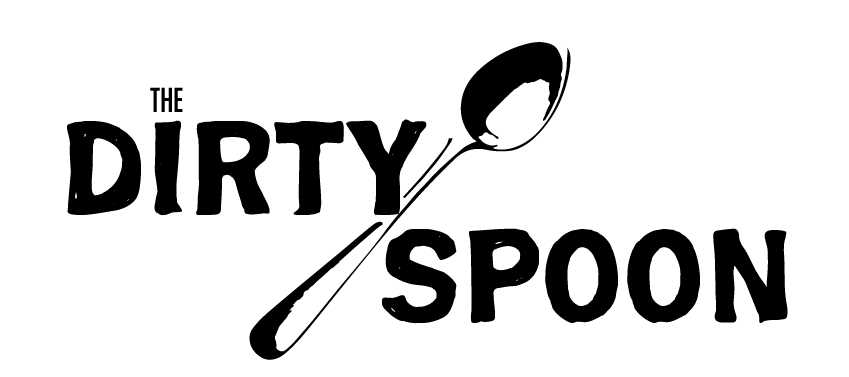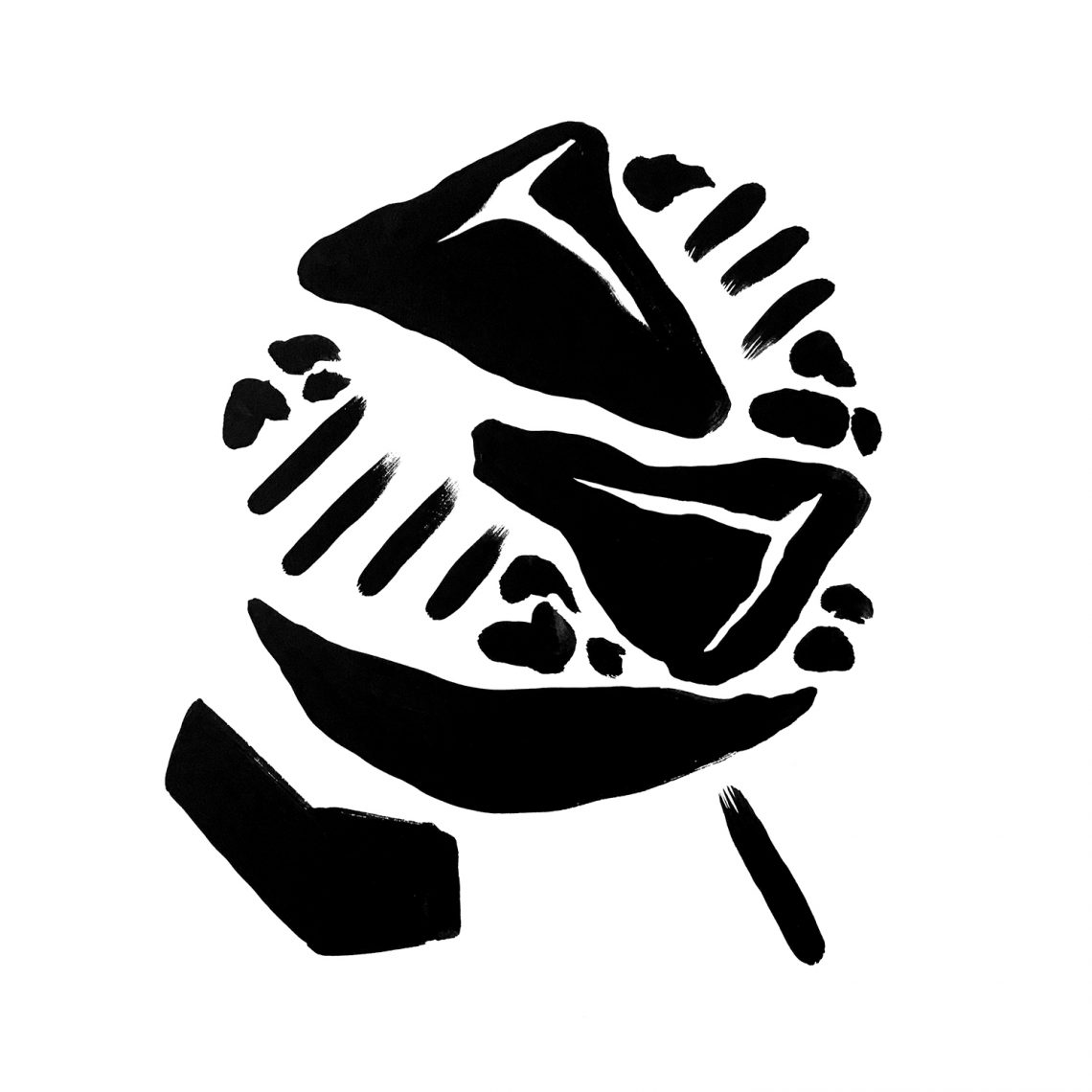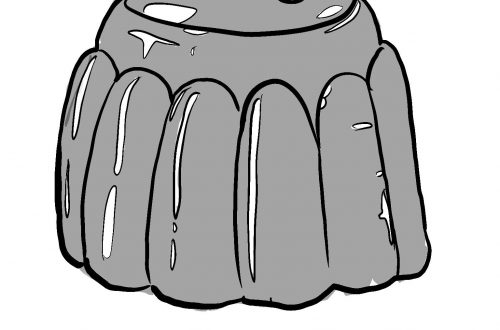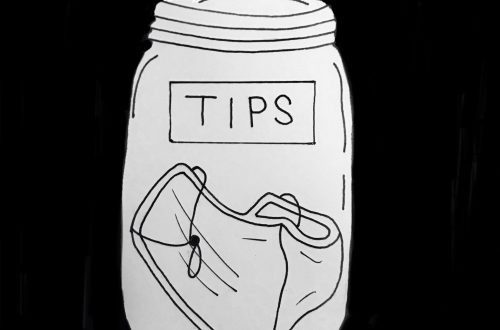by Deonna Kelli Sayed
Deonna’s essay appears in episode 13 of the Dirty Spoon Radio Hour, which originally aired on August 2, 2019.
My 17-year-old son, Ibrahim, decides that he wants to cook for a friend. He pulls the small, cheap grill out of the closet. After a winter in hibernation, the grill is now missing a leg, but this is not a deterrent.
“What are you cooking?” I ask.
“Steak,” he says. He’s very serious. His body language is charged. He is, dare I say it, acting manly.
“Steak? You bought steak?” I ask.
He bought steak with his recent paycheck from a catering gig with the French Chef that is also one of my many part-time jobs. We recently worked a wedding, and now, Ibrahim is holding two raw T-bones purchased with his tip money. He is ceremonial. The opportunity to cook meat over an open flame has unearthed something primal.
Outside is too humid, even in early evening. He wipes sweat from his face. “I know how to cook steak,” he says. “After all, I am Afghan.”
Ibrahim is half-Afghan, to be exact. The other half is me and American. Our kitchen is global fusion. Some of his friends, the tall blond ones who drive the family SUVs, are amazed that we cook entire meals from scratch.
***
Ibrahim likes to tell a story about the summer he spent in Saudi Arabia with his father. Ibrahim had carefully pan fried a steak until exquisitely medium rare. He had adopted a particular philosophy about beef. He had learned by watching cooking shows on YouTube.
“This is raw!” His father exclaimed. Then his father put a perfectly seared piece of steak into the microwave.
“When it came out,” Ibrahim later shared, “the meat was just…gray.” This travesty, often retold, represents the differences my son has with his father: differences around religious practice, identity, and the right way to cook meat.
“My father knows nothing about the world,” Ibrahim decides while bent over the small grill, now propped up on one-side with a brick. He stokes the charcoal when he looks up and asks,
“How long do I wait before I put the steak on?”
***
Food is the map for how far I’ve traveled from my origin story.
I grew up on pork chops and grits in the Florida Panhandle. As an only child, I rode my little Honda 50 motorcycle up and down a rutted country dirt road. Grandma lived on the other side of the field, within hollering distance. Food functioned as a communal experience; everyone I knew ate the same things. This was evident at every family reunion, every church supper, every holiday meal: Mamie’s Sweet Potato Casserole, Gracie’s Veg-All Casserole, Aunty Linnie’s Banana Pudding, Uncle Archie’s ham, Big Momma’s fried chicken. I could go on.
My childhood was a certain very delicious, and predictable menu, locked in place by Southern tradition. I was 12 years old before I tried Chinese food, and I had to go all the way to Jacksonville to do it.
At Ibrahim’s age, I entered community college with a GED. I lived in Tallahassee where I encountered hummus years before it would become available in plastic tubs at grocery stores. I ate grape leaves and Pad Thai. Still trapped in the Florida Panhandle, I used food to take me to places I couldn’t yet go.
I eventually married a man from Afghanistan and away I went.
I lived in Azerbaijan during my pregnancy. My cravings raged from the Azeri MacDonald’s cheeseburger that reminded me of home, to the street food, Qutab, a savory pancake filed with meat and spice. I grew fat on Russian Honey Cake during my last trimester. Ibrahim entered the world in Baku’s Old City. Even in the womb, I was splitting my son’s tongue between continents, ensuring that his culinary cartography would be more spacious than mine.
Even in the womb, I was splitting my son’s tongue between continents, ensuring that his culinary cartography would be more spacious than mine.
During my marriage, food marked my husband’s restricted view of the world. I wanted endless possibilities; Ibrahim’s father wanted to be right. He insisted on eating halal meat, an effortless endeavor when we lived in the Middle East. This preference doesn’t indicate religious rigidity by itself, but he doubled down once we moved to a small Southern city where halal food was difficult to find.
The kind of meat we consumed functioned as an identity boundary: we ate halal meat to mark us as different from those who did not.
My ex kept a book of other prohibited items, like Styrofoam. I pondered: Styrofoam is awful for the environment, and therefore, unethical?
That wasn’t the logic. Apparently, a lubricant of beef or pork fat might be used in some brands. But you don’t eat the Styrofoam cup, I wanted to shout.
I know Ibrahim occasionally slips pig into his mouth. I know that he is drawing his boundaries with food, too, trying to chart who he wants to become.
***
Oh, the long wail of summer. The thick ripe heat of it, like a tomato about to burst.
We are always bursting in this life of ours.
My independence is now contingent on my Ibrahim’s part-time job in fast food. We share one decrepit car. He is a rising senior student and acts like he is all grown up. I have to remind him to gas up the car, to take the trash out, to wash his bed sheets. He texts to ask, “When is dinner?”
I confront him about his low grade in French when I get his final report card; the grade he hid from me because “he knows how I am.” Of course, I overlook the high marks he made in the harder, more advanced classes.
I yell at him. I tell him he needs to figure out who he wants to me. I tell him horrible, cliched things, like if he doesn’t take things more seriously, he will be flipping burgers the rest of his life.
Ibrahim has one more year of high school. I am 45 years old and live paycheck to paycheck. We are still delicate creatures, the two of us.
***
Last summer, Ibrahim spent three weeks in Afghanistan without his father, in the company of cousins and uncles. This was his first real visit to the country; a time he would actually remember. This time, he tried hashish. He and his uncle endured vicious food poisoning from a street vendor’s shour nakhud, chick peas in a mint and coriander chutney. When Ibrahim returned to America, he informed me that he had gone to the hospital in Kabul. “Just for fluids,” he clarified, as my face turned pale with this new information.
“The food over there is so good,” he exclaims, “and everyone wants to feed you!”
Now, he has one hand in the Indian store’s ice cream freezer as he reaches for a pistachio kulfi when he asks, “Hey, what’s that dried lamb called?”
“Lahndi.” I surprise myself by instantly recalling the name in Dari (Afghan Farsi) of the dense, salty meat traditionally cured for winter months Afghanistan. I can’t describe the taste – there are no words in English – it has a deliciously gamey, chewy, concentrated flavor, something almost holy. Lahndi is the one true Afghan meat, something borne in the steppes of Central Asia.
I remember the first time I tried landhi. Ibrahim was still small, maybe six years old, and we sat Indian style on thick floor cushions in Peshawar. It was winter — the dried meat is a cold weather food – and a long blue dress cloaked my legs. By the end of the meal, my hands would be slick with grease from landhi and rice heaped high on a large platter. Ibrahim’s paw prints would dot my dress to stain it forever.
I felt so complete at that moment, catching fragments of Dari and speaking back in almost full sentences. Look how far this Florida girl has traveled! I failed to taste the approaching decay. Three years later I would leave the marriage, the meat, and the modest dresses for an uncertain, very American future.
Ibrahim holds up a creamy, cold kulfi stick from the freezer: pista he says in Dari. Pistachio? He rarely speaks Dari with me. When I try, he protests.
Ne, I shake my head. Um, I say.
“Um…what?”
“Mango. The Dari word for mango is um.”
I remember names of food. I remember that he is only 17 years old. I remember he has always been his mother’s child. He didn’t sleep in his own bed until he was six years old. He slept next to me, first wrapped tight around my hair, his breath tethered to mine.
Ibrahim chooses the pistachio.
Memory and language live on the tongue.
Where do they go when they leave?
***
I started working for the French Chef during the Christmas season when Ibrahim was thirteen years old. Desperation rolled like smoke in my mouth. I stank of it. I was recently unemployed, fired from a position at a mental health clinic.
A friend suggested the French Chef might be hiring seasonal help.
It was for Ibrahim that I worked cocktail parties and limped in pain after, too poor to buy good shoes. I would cry in gratitude while driving home, a bag full of leftovers in the passenger seat, sometimes with extravagant things like beef tenderloin and dark chocolate mousse. We managed to eat for a month from the holiday excesses of the rich.
I was so fragile that winter, almost broken and always scared. Ibrahim never knew that I felt ruin waiting around the next corner.
Four years later, Ibrahim has mastered steak and chocolate chip cookies, an American miracle invented by two female chefs in 1938. Even the French Chef is impressed with the cookies. The recipe Ibrahim uses is from a cookbook called A Taste of Home. An Afghan boy perfecting the American chocolate chip cookies…it is wonderful.
In a year, Ibrahim will be unleashed into the world. This is a very American rite-of-passage, to send our children away to college as half-formed things. I cannot recall the last time I told Ibrahim that I love him. Instead, I remind him to wash his sheets. Instead, I say things like, “Did you eat?”
These days, I return to the Middle East at least once a year. Ruin feels like it lives a few blocks away. It is at more of a distance, at least.
I can remember the Persian word for life, zendagi.
Everything real decomposes, like food and unused language. Even our stories shatter to ripen again. Oh, the long wail of life, the thick heat of it. Ibrahim and I, we are always growing up. May we burst from the delight of it all.
Custom artwork by Garnet Fisher.

About Deonna Kelli Sayed






